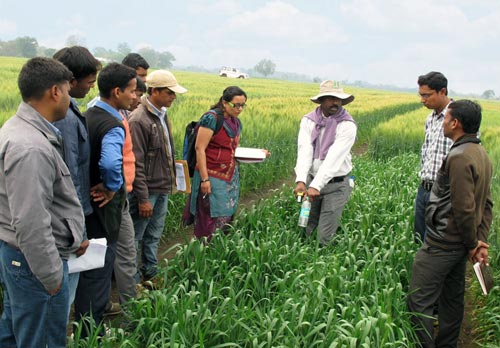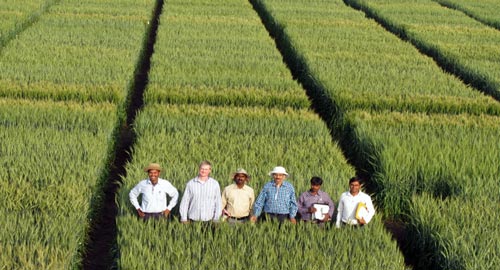By Arun Joshi, Ravi Singh, R. Valluru and Uttam Kumar/CIMMYT
Wheat researchers in India learned about CIMMYT’s newest advanced wheat lines during field days this spring at each of the locations of the Borlaug Institute for South Asia (BISA) —Jabalpur, Pusa-Bihar and Ladowal-Ludhiana. The events were designed to link Indian wheat breeders and pathologists with a new Feed the Future-USAID project that uses genomic selection to rapidly develop climate-resilient wheat varieties for South Asia.

At each event, participants saw the advanced wheat lines planted at the BISA locations as part of the USAID project and learned how they are different from the present CIMMYT lines distributed across India and around the world. In fact, these lines will become part of CIMMYT trials and nurseries in the next crop cycle. The participants selected the best wheat lines according to the requirements of their breeding program, and each participating center will be given enough seed from those lines to develop replicated trials in the coming cycle.
The field days were organized by CIMMYT in collaboration with the Indian Council of Agricultural Research’s (ICAR) Directorate of Wheat Research (DWR). More than 70 wheat breeders and pathologists from 22 wheat research centers in India, including ICAR institutes and universities, attended. Dr. Indu Sharma, DWR director, took a very active role in the events, encouraging wheat centers from India to participate. Four GWP scientists from CIMMYT —Ravi Singh, Arun Joshi, Ravi Valluru and Uttam Kumar— also played important roles. The events were facilitated by CIMMYT colleagues based at BISA locations, notably H.S. Sidhu, Raj Kumar Jat and Nikhil Singh. Other field day activities included:
• Characterizing various lines based on their morpho-physiological traits and resistance to diseases, such as yellow rust at Ladowal-Ludhiana and spot blotch at Pusa-Bihar.

• Training in the use of infrared thermometers to measure canopy temperature in wheat plots.
• Visits to other trials and facilities at BISA locations.
• An interactive session where participants could ask questions and exchange views on the genomic selection project and other activities in the region.
The USAID project, which is a partnership of Kansas State University, Cornell University, the U.S. Department of Agriculture and CIMMYT, will use genomic selection in the new wheat lines to track genetic variances for heat tolerance, with a goal of reducing the breeding cycle in the future. The genomic data collected will be used to manage the genetic diversity and the retention of favorable alleles in the population, safeguarding prospects for long-term genetic gains.
 Capacity development
Capacity development